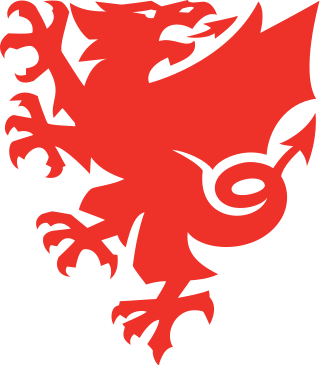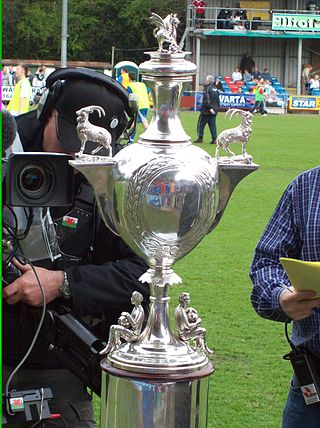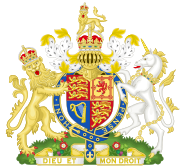
Newport County Association Football Club is a professional association football club in the city of Newport, South Wales. The team compete in EFL League Two, the fourth level of the English football league system. The club's usual home colours are amber shirts and black shorts.
The Cymru Premier, known as the JD Cymru Premier for sponsorship reasons, is the national football league of Wales. It has both professional and semi-professional status clubs and is at the top of the Welsh football league system. Prior to 2002, the league was known as the League of Wales (LoW), but changed its name as part of a sponsorship deal to the Welsh Premier League. The league was rebranded as the Cymru Premier for the 2019–20 season.

The Football Association of Wales is the governing body of association football and futsal in Wales, and controls the Wales national football team, its corresponding women's team, as well as the Wales national futsal team. It is a member of FIFA, UEFA and the IFAB.

Barry Town United Football Club is a semi-professional association football team based in Barry, Wales. They are known for representing Wales in Europe as winners of the Cymru Premier and Welsh Cup during the 1990s and early 2000s and have also competed in England's Southern League and FA Cup. The team, which has contained more than 50 full internationals, is now run by supporters. They play at their traditional home of Jenner Park, Barry, which holds 3,500 spectators.

The FAW Welsh Cup, currently known as the JD Welsh Cup for sponsorship reasons, is a knock-out football competition contested annually by teams in the Welsh football league system. It is considered the most prestigious of the cup competitions in domestic Welsh association football.

Wrexham Association Football Club is a professional association football club based in Wrexham, Wales. Formed in 1864, it is the oldest club in Wales and the third-oldest professional association football team in the world. They compete in EFL League Two, the fourth level of the English football league system.
The FAW Premier Cup was a Welsh football cup competition, organised annually by the Football Association of Wales from 1997 to 2008. Since the FAW excluded clubs playing in English leagues from playing in the Welsh Cup from 1996 onwards, the FAW needed another competition where the best Welsh teams could compete.
The Welsh football league system is a series of football leagues with regular promotion and relegation between them.
Association football is organised on a separate basis in each of the four constituent countries that make up the United Kingdom (UK), with each having a national football association responsible for the overall management of football within their respective country. There is no United Kingdom national football team. Football has been the most popular sport in the UK since the 1860s. Rugby union, rugby league and cricket are other popular sports.

Merthyr Town Football Club is a Welsh semi-professional football club based in Merthyr Tydfil, currently playing in the Southern League Premier Division South, in the seventh tier of the English football league system.

Colwyn Bay Football Club is a professional football club based in Old Colwyn in north Wales. They are currently members of the Cymru Premier. Nicknamed the Seagulls, but also known as 'The Bay', their home ground is Llanelian Road in Old Colwyn.
Association football is one of the most popular sports in Wales, along with rugby union. Wales has produced club teams of varying fortunes since the early birth of football during the Victorian period, and in 1876 a Wales national football team played their first international match. Football has always had a close rivalry with the country's de facto national sport rugby union, and it is much discussed as to which is Wales' more popular game. The Football Association of Wales (FAW), was established in 1876 to oversee the Wales national team and govern the sport in Wales, later creating and running the Welsh football league system.
The 1992–93 League of Wales was the inaugural season of the League of Wales, the top division of Welsh football. The League was made up of 20 member clubs that joined from leagues within both the English football league system and Welsh football league system.

Daniel Holmes is an English football manager and former player who is currently managing Northern Premier League club Vauxhall Motors. He is a product of Tranmere Rovers' youth system.

The 2011–12 FAW Welsh Cup was the 125th season of the annual knockout tournament for competitive football teams in Wales. The 2011–12 tournament commenced on 13 August 2011, and ran until the final in May 2012. The winner of the Cup qualified to the first qualifying round of the 2012–13 UEFA Europa League.
Women's football in Wales is overseen by the Football Association of Wales and is affiliated with both the world (FIFA) and European (UEFA) football governing bodies. As such the national team are eligible to compete in the World Cup and the European Championship. The winners of the top tier league is invited to join the qualifying stage of the Champions League.

The 2021–22 FAW Welsh Cup was the 134rd season of the annual knockout tournament for competitive football teams in Wales. The New Saints were the competition's winners, the eighth time they had triumphed.









